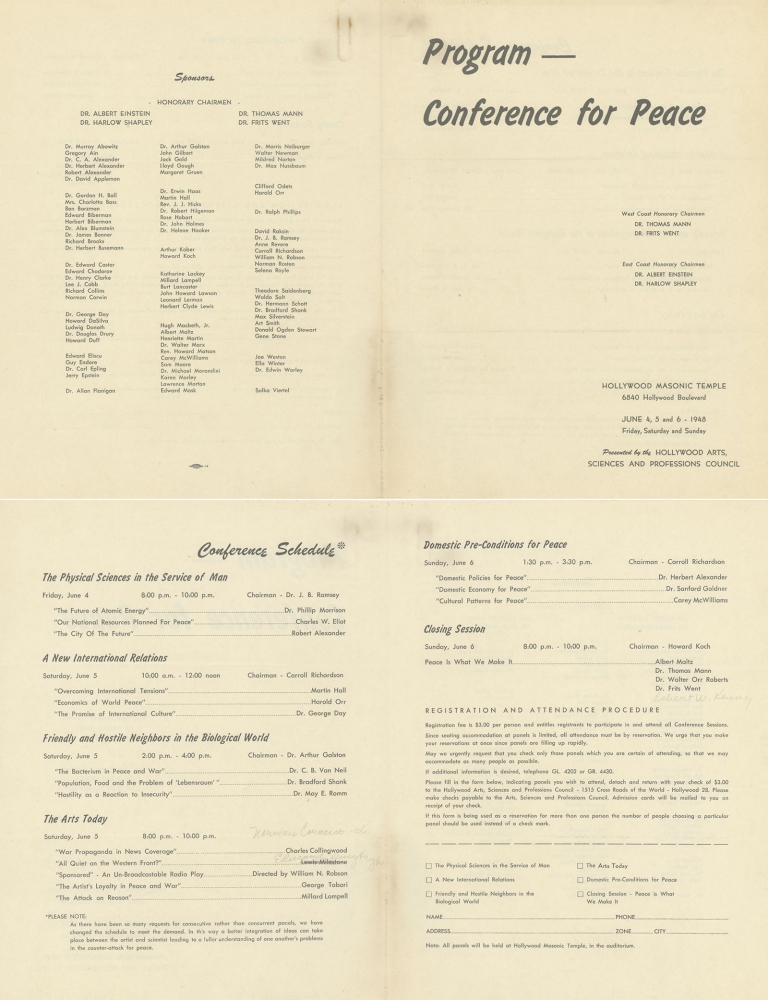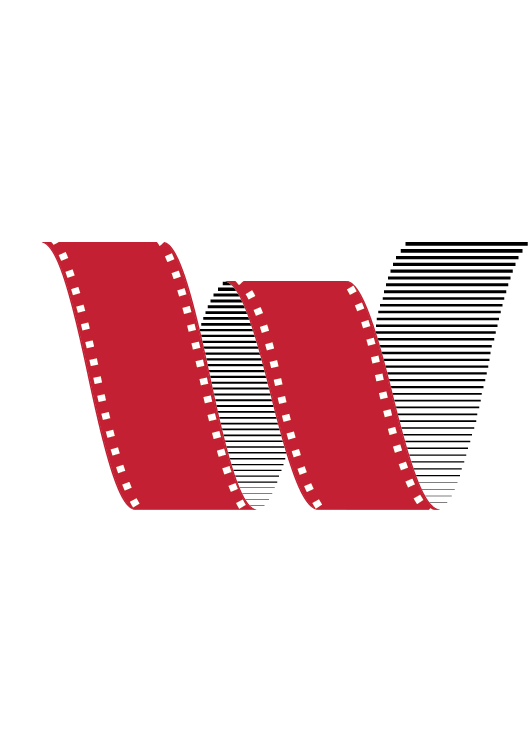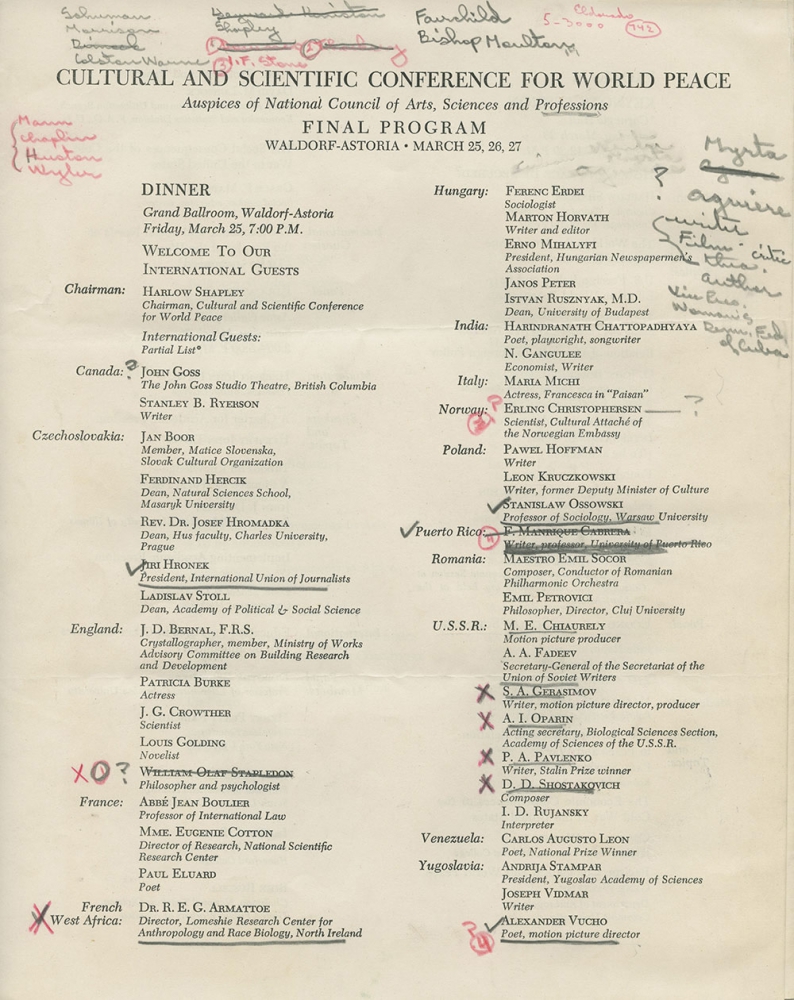Because of the HDC’s ties to politics and Hollywood, many of their efforts challenge artificial distinctions sometimes made between “media history” and “American history.” Moreover, the organization’s efforts in so many different legislative and cultural areas make any attempts at a comprehensive timeline of their creative output or legislative battles futile. Fortunately, however, HDC executive secretary George Pepper wrote an eighty-page report about the key accomplishments of his organization through its nearly decade-long period of high activity.
The following list culled from these notes tells several stories—the history of a profession-based civic organization that began as the HDC, an account of 1940s Hollywood and radio industry texts and practices, and the role of Hollywood as a site of American political action for issues including world peace, racial equity, and freedom of expression.
Although it remains inconclusive as to exactly when and why the organization that began as the HDC finally stopped organizing, several possibilities present themselves. First, the pressures from the U.S. government over the organization’s pro-peace and intellectual freedom activities during the Cold War likely made it an uncomfortable bedfellow for the creative workers who provided the backbone of its organizational activities. Furthermore, a series of mergers with non-Hollywood creative organizations in New York and elsewhere may have diluted the appeal of the HDC as a membership organization for stars and lead to disenfranchisement when political mobilization turned toward broader issues within science and the arts. These factors, combined with a series of legislative and electoral defeats in 1946 and beyond, provide some clues as to why the HDC dissolved after such a successful and impassioned stint in American politics.
1943
- Hollywood heavyweights meet in January to nominate people for elections, sign membership cards, and outline a constitution. First official membership meeting takes place in March.
- HDC organizes “A Message to Washington,” its first mass meeting, which includes a dramatic sketch broadcast on major networks.
- Target for Today, the HDC’s official legislative information magazine, reports on interviews of congress members taken during the recess. Negative scores given to those “at war with the President’s Win-the-war program” and publicized widely.
1944
- HDC’s election activities begin in earnest in January when they outline their program for the ’44 elections and plan voter registration drive activities for February and March. Radio show “Let’s go out and Ring Doorbells” is broadcast nationally over NBC and locally over KMPC as part of Registration Week.
- In response to the racial violence of Zoot Suit Riots (L.A., May 1943), HDC organizes “United We Stand” Rally to dramatize contributions of minorities in war efforts.
- “Hollywood Town Meeting” airs in May on CBS as part of primary elections activities.
- Throughout the fall, HDC publishes campaign material, hosts special dinners and political rallies, and continues special radio shows leading up to the eve of the election.
- FDR reelected to a fourth term.
1945
- After the House Committee on Un-American Activities (HUAC) is made permanent through unprecedented political maneuvering, HDC writes to house members asking them to limit HUAC’s funding.
- Working with Treasury Secretary Morgenthau, HDC produces “The Crew of the Model T,” which explains and champions the Bretton Woods agreement. The show is broadcast nationally on ABC Blue.
- HDC becomes HICCASP June 6.
- “American Caravan,” a program to support unity and international cooperation, is performed in L.A. and broadcast nationally on June 27.
- After HUAC, lead by Representative John E. Rankin, attacks HICCASP in July for possible ties to communism, HICCASP writes to the White House detailing election and war effort activities and begins a public campaign against the congressman.
- When notorious anti-Semitic domestic fascist Gerald L. K. Smith organizes a public meeting in Los Angeles, HICCASP bands together with hundreds of other progressive organizations to throw “An American City in Action Rally” as a counter protest held the same night. In September, HICCASP collaborates with other organizations to sponsor the Inter-Racial Choral Festival in the Hollywood Bowl.
- In December, HICCASP hosts “Atomic Energy and Foreign Policy” mass meeting and “Conference on Atomic energy,” which endorse the stand of public officials and scientists against military control of nuclear power. The latter conference goes on record against May-Johnson bill and endorses the McMahon Bill.
1946
- HICCASP holds an emergency meeting to brainstorm measures to fight the Lea Bill, anti-labor broadcasting legislation that would strip musician union members of their right to strike or negotiate on issues such as working conditions or royalties. The meeting results in a protest resolution telegraphed to Variety. The act was eventually passed in April and withstood a constitutional challenge before the Supreme Court in 1947.
- In the legislative arena, HICCASP pushes for a continuation of price ceilings.
- Harold Ickes becomes executive chairman of national ICCASP, and HICCASP officially affiliates with ICCASP at membership meeting.
- As part of their Civil Rights agenda, HICCASP participates in National Abolish the Poll Tax Week, March 24-31. In April, HICCASP sponsors an All-Star Variety Show that supports an anti-poll tax bill. HICCASP also calls a Palestine Protest Meeting to condemn discrimination against Jews and ask Truman to admit Jews into Palestine.
1947
- In January, HICCASP amalgamates with newly formed PROGRESSIVE CITIZENS OF AMERICA (PCA). Retains autonomy as the Arts, Sciences, and Professions Council of the Progressive Citizens of Southern California (ASP-PCA).
- ASP-PCA holds a meeting to discuss protests against HUAC and President Truman’s recent executive order demanding loyalty oaths forbidding sympathy with any totalitarian, communist, or subversive organizations. In July, ASP-PCA publishes a book-length study, Thought Control in the United States.
- J. Parnell Thomas arrives in Hollywood to hold preliminary investigations of Communism in motion pictures and serves subpoenas to motion picture artists. ASP-PCA members band with others to create the Committee for the First Amendment. The new organization issues a twenty-four-page brochure detailing “un-American” activities of the Thomas committee.
- HUAC begins public hearings on nineteen “unfriendly” witnesses in October. “Hollywood Fights Back” airs on ABC on October 26 and November 2. The radio show features statements from stars, directors, and others protesting the actions of HUAC. On October 28th, twenty-eight producers, writers, and actors fly to Washington to watch hearings in person. The next day, on Oct 29th, twenty-nine members of the Committee for the First Amendment present a petition to congress protesting the possibility of a blacklist. During the hearings, ASP-PCA produces a daily news bulletin about the committee’s activities.
- In November, the House of Representatives votes 346-17 to hold the Hollywood Ten in contempt of Congress. The Board of Directors of the Screen Writers Guild initially votes to resist threatened blacklist. Waldorf Statement issued by the Motion Pictures Association of America blacklists the Hollywood Ten.

1948
- In February, ASP-PCA holds the “All Arts Stop Censorship Conference.” A “Stop Censorship” action meeting is also held at the Hotel Astor in March.
- In April, ASP resolves to withdraw from PCA, since many PCA groups are merging with Wallace for President Committees. ASP-PCA officially joins National Council of the Arts, Sciences and Professions (NCASP), an independent cultural organization. The Hollywood chapter is named H-ASP.
- NCASP’s “Pattern for Survival” conference occurs in New York at the Waldorf Hotel with papers delivered by educators and intellectuals warning against the consequences of the Cold War. H-ASP’s own “Conference for Peace” occurs the same weekend.
- H-ASP opposes the Loyalty checks instituted in LA schools and participates in National Conference on Academic Freedom in October.
- Henry Wallace is defeated in November when Truman wins first full term.
1949
- At the beginning of the year, NCASP invites world scientists and intellectuals to the Cultural and Scientific Conference for World Peace. In March, the State department refuses visas to all delegates except those from Soviet bloc. NCASP protests and criticizes the State Department for attempting to paint the conference as a Communist affair. Amid negative news coverage, the conference takes place March 25-27 as scheduled.
- In June, Helen Keller, Dorothy Parker, Danny Kaye, Frederic March, John Garfield, Paul Muni, and Edward G. Robinson are named communists by FBI reports.

